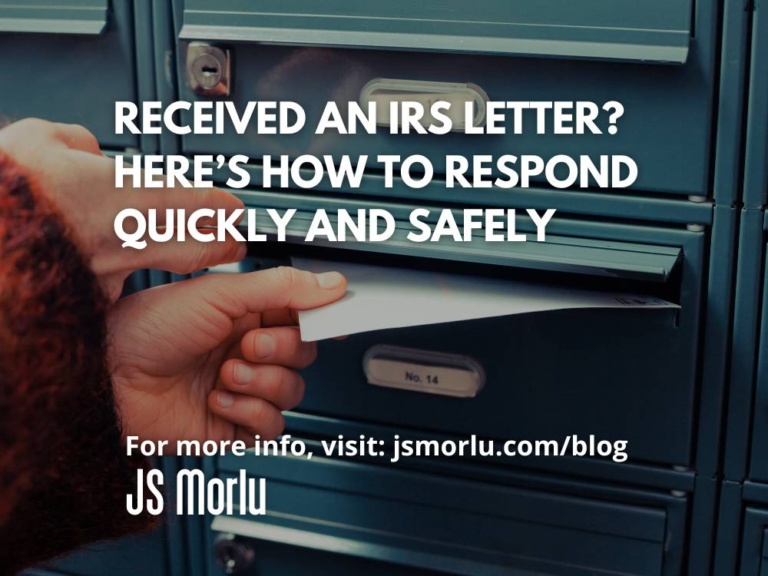In the age of direct deposits, the thrill of a tax refund check arriving in the mail feels like a relic of the past. However, the IRS still communicates with taxpayers through letters, and these can sometimes be cause for concern. Thanks to sophisticated computer matching programs, the IRS conducts a significant portion of its audits via correspondence. So, if you find an IRS letter in your mailbox, don’t panic! Let’s break down what these letters might mean and what steps you should take.
Why You Might Get an IRS Letter
The IRS uses letters to communicate a variety of things to taxpayers. Here are some common reasons you might receive an IRS letter:
- Information Update: This could be a notification about a change made to your tax return, such as an adjustment to your refund amount.
- Verification Request: The IRS might need additional documentation to verify information on your return.
- Audit Notice: While not the most pleasant news, an IRS letter could be an audit notification. This doesn’t necessarily mean you’ve done something wrong, but the IRS needs to clarify some details on your return.
- Payment Request: If you owe taxes, the IRS will send a letter outlining the amount due and the deadline for payment.
- Collection Action: If you haven’t responded to previous requests for payment, the IRS may send a more forceful collection notice.
The Importance of Taking Action
Regardless of the reason for the letter, it’s crucial to take action promptly. Most IRS letters will have a deadline for response. Ignoring the letter could result in penalties, interest accrual, or even collection actions like wage garnishment.
Here’s what to do when you receive an IRS letter:
- Read Carefully: Take your time to understand the letter completely. It should clearly outline the issue, any deadlines, and any next steps you need to take.
- Gather Your Documents: The letter may request specific documents to support your filing. Gather these together for easy reference.
- Respond on Time: Meeting deadlines is crucial. If you need more time to gather information or make a payment, contact the IRS as soon as possible to discuss your options. The phone number for your designated IRS office will likely be included in the letter.
- Seek Professional Help: If the letter is complex or raises concerns, consider seeking professional help from a tax preparer or enrolled agent. They can guide you through the process and ensure you’re responding appropriately.
Stay Alert for IRS Impersonators
It’s crucial to be aware of IRS-related scams. Remember, the IRS will never initiate contact with taxpayers by phone, email, or through social media to request personal or financial information. If you receive a suspicious phone call or email claiming to be from the IRS, do not engage. Instead, report it to the IRS.
Gain Insights with Our Video Guide
For a detailed explanation of how to handle an IRS letter, watch our informative video below. This video covers the key points discussed in this article and provides additional tips on managing your tax-related communications effectively.
Don’t Delay: Responding Promptly Matters
Ignoring an IRS letter can lead to a snowball effect of complications. Here’s why a timely response is crucial:
- Penalties and Interest: Delays can trigger additional charges on top of any owed taxes.
- Wage Garnishment: The IRS has the authority to garnish your wages to settle outstanding tax debts.
- Asset Seizure: In severe cases, the IRS can seize your property as a means of collecting owed taxes.
- Credit Score Impact: Unresolved tax issues can negatively affect your credit score, making it harder to secure loans or financing in the future.
Seeking Professional Guidance Can Ease the Burden
Tax issues can be intricate, and navigating them alone can be daunting. Consider seeking professional assistance from a tax advisor who can:
- Demystify the Notice: A tax professional can break down the specifics of the IRS letter and explain its meaning in clear terms.
- Verify Information: They can ensure the IRS has accurate information on your tax situation, potentially preventing further issues.
- Craft Your Response: Your advisor can help prepare the necessary documentation and craft a response that effectively addresses the IRS’s concerns.
- Negotiate on Your Behalf: In some cases, a tax advisor can negotiate with the IRS to potentially reduce penalties and find a favorable resolution.
Conclusion
While receiving an IRS letter can be stressful, it doesn’t have to be a cause for panic. By understanding the process, responding promptly, and seeking professional help if needed, you can address the situation effectively. Remember, taking these steps can minimize complications and ensure a smooth resolution to any tax-related issues.
For any assistance with IRS correspondence, feel free to contact our office. Our experienced team is here to guide you through the intricacies of tax matters and ensure your tax concerns are handled with expertise and care.
JS Morlu LLC is a top-tier accounting firm based in Woodbridge, Virginia, with a team of highly experienced and qualified CPAs and business advisors. We are dedicated to providing comprehensive accounting, tax, and business advisory services to clients throughout the Washington, D.C. Metro Area and the surrounding regions. With over a decade of experience, we have cultivated a deep understanding of our clients’ needs and aspirations. We recognize that our clients seek more than just value-added accounting services; they seek a trusted partner who can guide them towards achieving their business goals and personal financial well-being.
Talk to us || What our clients says about us


